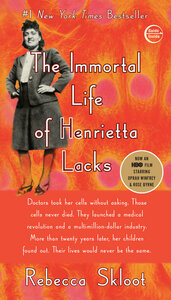You need to sign in or sign up before continuing.
Take a photo of a barcode or cover
SUCH an important read - eye-opening and well written. I learned so much about not only the science of cells and testing, but the history of racist testing on Black people. Henrietta's story (and her kids' stories) are heartbreaking and all too real for anyone who's grown up in poverty. In the end, it's hard to feel for scientists who so obviously care only about their own work instead of the lives they've affected...but then you have to think: where would we be without them? And, moreso, where would we be without Henrietta?
informative
reflective
medium-paced
This book was brilliant. I thought the balance between science and human interest worked very well, and I was genuinely moved by the family's experiences - enhanced by the narrative being consistently in their words and from their perspective. Hugely thought provoking. Great book.
emotional
informative
reflective
sad
fast-paced
I had always heard this book was good but it sounded kind of boring to me. I was wrong! Fascinating book that expertly weaves together the story of Henrietta's life, the story her children, and the story of the cells.
A fascinating history of immortal cells taken from a lady named, Henrietta Lacks, in 1951 without her knowledge. Her cells have since helped develop polio vaccine, they have gone into space, and been exposed to nuclear testing and cloning... “yet she remains virtually unknown, and her family can’t afford health insurance.”
“Today most Americans have their tissue on file somewhere... the stuff you leave behind doesn’t always get thrown out. Doctors, hospitals, and laboratories keep it.” These tissues are sold and can often lead to companies making profit off of research completed on these tissues. Should informed consent be obtained? Should people receive compensation if their tissues are used in research that leads to profit? If consent has to be obtained, will this lead to less donors and less research to obtain better medical interventions? An endless debate that majority of patients are unaware of.
“Today most Americans have their tissue on file somewhere... the stuff you leave behind doesn’t always get thrown out. Doctors, hospitals, and laboratories keep it.” These tissues are sold and can often lead to companies making profit off of research completed on these tissues. Should informed consent be obtained? Should people receive compensation if their tissues are used in research that leads to profit? If consent has to be obtained, will this lead to less donors and less research to obtain better medical interventions? An endless debate that majority of patients are unaware of.
challenging
dark
emotional
informative
sad
challenging
informative
inspiring
reflective
sad
slow-paced
The Immortal Life of Henrietta Lacks has been on my TBR list for a while. There was A LOT to this book and it has some good points and some drawbacks. If you want to feel really angry, make sure you read to the end of the Afterword!
It was a moving story when it talked about the family and all that they had been through before, during, and after Henrietta's illness and death. I found the information about how her cells were maintained and used on research to be fascinating.
The parts that dealt with the circumstances surrounding how her cells came to be "immortal" and much of the scientific information to be overkill for the scope and purpose of this book. I do enjoy a good science lesson, but this was too much and I would have really enjoyed focusing more on the family.
I was enraged at the current (ish - from 2009) state of affairs with informed consent re: your own personal tissue samples and what may happen to them. As soon as you have anything removed from your body, you no longer have any rights to it and it can be used without your knowledge or consent for whatever purposes researchers and scientists want. It can be bought or sold for however much money and you have no right to compensation. Personally I am not ok with that. I feel like I own my DNA and the idea of it being used for research (even genetic research) rubs me the wrong way. Thanks for coming to my TEDtalk.
It was a moving story when it talked about the family and all that they had been through before, during, and after Henrietta's illness and death. I found the information about how her cells were maintained and used on research to be fascinating.
The parts that dealt with the circumstances surrounding how her cells came to be "immortal" and much of the scientific information to be overkill for the scope and purpose of this book. I do enjoy a good science lesson, but this was too much and I would have really enjoyed focusing more on the family.
I was enraged at the current (ish - from 2009) state of affairs with informed consent re: your own personal tissue samples and what may happen to them. As soon as you have anything removed from your body, you no longer have any rights to it and it can be used without your knowledge or consent for whatever purposes researchers and scientists want. It can be bought or sold for however much money and you have no right to compensation. Personally I am not ok with that. I feel like I own my DNA and the idea of it being used for research (even genetic research) rubs me the wrong way. Thanks for coming to my TEDtalk.
Read this long ago and don’t remember how it was as a book, but a crucial story to know about!
Good book for anyone in science, especially professionals/paraprofessionals in the medical fields. Make sure to read to the Epilogue. Good philosophical synopsis there.
Very interesting subject matter, but also overly verbose and in need of better editing. Still, I wish I could give it 3.5 stars...






